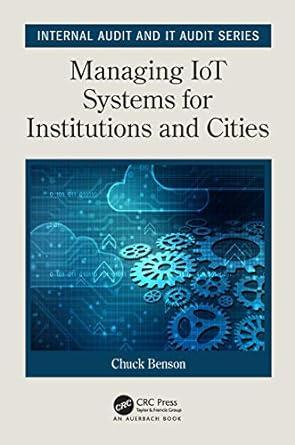Question
In the current issue of a business magazine, an accounting watchdog has written an article about the SECs failure to take a hard line on
In the current issue of a business magazine, an accounting watchdog has written an article about the SECs failure to take a hard line on accounting fraud in public companies. Despite all of the high profile accounting frauds uncovered in the past decade, the Securities & Exchange Commission appears to be focusing its efforts on going after Ponzi schemes rather than accounting fraud. Francine reports that of the 735 enforcement actions brought by the SEC in 2011, only 89 were related to fraudulent or misleading accounting and disclosures by public companies.
Some people say that Sarbanes Oxley has been doing its job relative to increasing prevention and detection of accounting fraud, but evidence of that is almost non-existent. Auditors would have the public believe that auditors are being more effective in finding and reporting fraud, but the evidence does not back this up.
What has been happening is that public companies are more likely to change their previously issued financial statements in a way that most users of the financial statements will never notice.
Many users of financial statements are familiar with financial restatements. When a public company amends previously reported numbers in this way, the company must file an 8-K with the SEC, alerting investors of the change.
In contrast, companies can make revisions to their financial statements without filing an 8-K. This makes it more likely that the change in the numbers fly below the radar of investors. Such changes to the financial statements are more informal, and are done when the change is deemed to be not material.
The accountant reports:
Never heard of a revision? Companies and auditors like it that way. With a formal restatement, a company must file a special form, 8-K, calling attention to its corrections. With a revision it can fix flawed accounting without filing an 8-K or formally restating old earnings, since the change supposedly isnt material. With a revision executives prior pay isnt at risk, auditors dont have to retract their approval of earlier statements, and theres usually little impact on the stock and so no investor lawsuits.
This is important because in 2005, revisions of financial statements accounted for 33% of corrections to financial statements, according to a study by Audit Analytics. In 2011, revisions accounted for 57% of corrections to financial statements. This suggests that companies may be more likely to do the kind of fixes that go unnoticed by the market.
What makes me think that the revision process may be abused to hide financial problems? Look no further than ABC Company. Francine reports:
In 2010 ABC, which sells K brewers and K-Cups, said it had found an immaterial accounting error in the inter-company markup in its K-Cup inventory balance that would be fixed with a revision in one quarter. Its auditor, PricewaterhouseCoopers, signed off on that approach. Yet after the SEC raised questions the company ended up restating earnings from 2007 through the third quarter of fiscal 2010 to address that and other errors. PricewaterhouseCoopers, for its part, then flagged (retrospectively) material weaknesses in ABCs internal controls but stated theyd been fixed. The SEC is still investigating.
One saving grace: Revisions to prior financial statements are often noted in the 10-Qs or 10-Ks that companies must file with the SEC. If youre willing to read all the way through these, you might find information on a revision.
Investors need to be more diligent in their scrutiny of the numbers. They cannot rely on the SEC to find the fraud for them. Companies know their chances of being caught manipulating the financials are relatively slim. Investors must analyze the numbers to find red flags. When various metrics dont make sense or appear to provide conflicting indicators of a companys performance, beware that accounting fraud may be in play. (Fraud Files Forensic Accounting Website, 2017
Required:
(a) Analyse the issues highlighted by the article on financial statement fraud.
The company publishing materially incorrect financial statements to users publicly.
(b) Explain in detail the Financial Statement Fraud Interaction; CRIME.
Step by Step Solution
There are 3 Steps involved in it
Step: 1

Get Instant Access to Expert-Tailored Solutions
See step-by-step solutions with expert insights and AI powered tools for academic success
Step: 2

Step: 3

Ace Your Homework with AI
Get the answers you need in no time with our AI-driven, step-by-step assistance
Get Started


